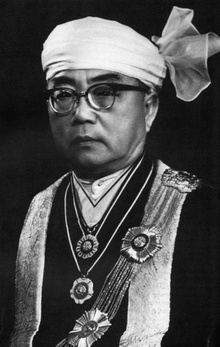Sao Shwe Thaik facts for kids
Quick facts for kids
Agga Maha Thray Sithu
Agga Maha Thiri Thudhamma Sao Shwe Thaik
Saopha of Yawnghwe
|
|
|---|---|
|
စဝ်ရွှေသိုက်
|
|

Shwe Thaik in 1948
|
|
| Speaker of the Chamber of Nationalities | |
| In office 1952–1960 |
|
| 1st President of Burma | |
| In office 4 January 1948 – 16 March 1952 |
|
| Preceded by | George VI (as the King of British Burma) Hubert Rance (as Governor of British Burma) |
| Succeeded by | Ba U |
| Saopha of Yawnghwe | |
| In office 8 March 1929 – 2 March 1962 |
|
| Preceded by | Sao Maung |
| Succeeded by | None (abolished) |
| Personal details | |
| Born | 16 October 1895 Yawnghwe, British Raj |
| Died | 21 November 1962 (aged 67) Rangoon, Burma |
| Political party | AFPFL |
| Spouses | Sao Nang Yi Sao Nang Sanda Nang Nyunt May Sao Hearn Hkam Nang Mya Win |
| Children | Sao Hseng Hpa Sao Hseng Ong Sao Nang Mya Sanda Sao Hso Hkan Hpa/Hso/Tiger Sao Tzang Sao Ying Sita Sao Hso Hom Hpa/Myee Myee Sao Hso Harn Hpa/Harn Sao Ratana Hseng Leun Nang Htila (adopted) Sao Nang Haymar Sao Hseng Wan |
| Parent | Sir Sao Maung |
| Alma mater | Shan Chiefs School, Taunggyi |
Sao Shwe Thaik (Shan: ၸဝ်ႈၶမ်းသိူၵ်ႈ; Burmese: စဝ်ရွှေသိုက် 16 October 1895 – 21 November 1962) was a very important political figure in Burma (now Myanmar). He became the first President of Burma when the country gained its independence. Before that, he was also the last Saopha of Yawnghwe, which means he was a traditional ruler of a region in the Shan State. His home in Nyaung Shwe (Yawnghwe), called the Haw, is now a museum that people can visit.
Contents
Early Life and Leadership
Sao Shwe Thaik was born on October 16, 1895, in a place called Yawnghwe, which was then part of the British Raj. He went to school at the Shan Chiefs School in Taunggyi.
He served in the British military during World War I. Later, he worked in the Northeast Frontier Service from 1920 to 1923. In 1927, local leaders chose him to become the next saopha of Yawnghwe, following his uncle. He officially took on this role on March 8, 1929. He also served in the military again from 1939 to 1942. He was married five times and had children. His first wife was Sao Nang Yi. He then married Sao Nang Sanda. Sao Nyunt May became his third wife. His next union was with Sao Hearn Hkam. His last spouse was Daw Mya Win.
Becoming the First President
On January 4, 1948, Burma became an independent country. Sao Shwe Thaik was chosen to be its very first President. He served as the head of state from this day until March 16, 1952.
A Message of Unity and Peace
On the day Burma became independent, January 4, 1948, President Sao Shwe Thaik gave a speech to the nation. He spoke about the joy of independence, which came from peaceful talks rather than fighting. He also emphasized the importance of unity among all the different groups of people in Burma.
He said that independence was a day of "reunion" for the main groups like the Kachins and Chins. He hoped that everyone would work together for the country's future. He believed that unity was key to their success and should remain important for the new "Union of Burma."
One year later, on January 4, 1949, he gave another important speech. He warned against violence and stressed that cooperation and understanding are only possible when there is no threat of violence. He believed that freedom and liberty cannot exist where violence begins. He also spoke about the challenges and conflicts happening within the country at that time.
Later Years and Legacy
After his time as president, Sao Shwe Thaik became the Speaker of the Chamber of Nationalities. This was like being the leader of one of the houses of parliament, from 1950 to 1962.
In March 1962, the military took control of the government in what is known as the military coup. Sao Shwe Thaik was arrested by the new military council. He died in prison in November 1962. Sadly, one of his sons also died during this time, at the age of 17, during the events of the coup.
See also
 In Spanish: Sao Shwe Thaik para niños
In Spanish: Sao Shwe Thaik para niños
 | George Robert Carruthers |
 | Patricia Bath |
 | Jan Ernst Matzeliger |
 | Alexander Miles |

